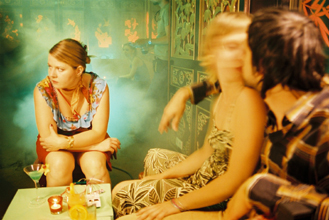Sign of Escape
Nina Kusturica
Österreich 2003

|
* Delphi 06.02. 13.45 |
Produktion: Universität für Musik und Darstellende Kunst Wien
Weltvertrieb: Austrian Film Commission,
Stiftgasse 6, A-1070 Wien
Tel.: (43-1) 526 33 23-0, Fax: 526 68 01
E-mail: office@afc.at; www.afc.at
Buch: Barbara Albert
Kamera: Tim Tom
Darsteller: Liese Lyon, Manfred Stella, Mira
Miljkovic, Igor Bararon, Dagmar Schwarz
Format: 35mm, 1:1.66, Farbe
Länge: 90 Minuten, 25 Bilder/Sek.
Sprache: Deutsch, Bosnisch
Claudia, Sladjana und Margit are of different ages and from different social backgrounds. Step by step each of them starts to realise what kind of a permanently shocking state they have accepted as normal for so long. All three are stuck in relationships of violence. Dragan, Sladjana‘s husband, suddenly starts to torture his wife with attacks of jealousy. He punishes Sladjana by taking the children away from her and taking them to his mother. A few days after Werner is forcibly removed by the police from his apartment on charges of domestic violence, he repentantly returns to his wife Claudia. Tearfully, he begs for forgiveness and Claudia agrees to accept him again in the apartment. Shortly afterwards however, when Claudia returns home later than agreed from a meeting with her friend Susi, Werner explodes again and rapes her. Margit’s life is dominated by the fear of her husband Hans. By means of esoterica, karaoke and French lessons, she tries to thrust aside her misery. Her attempts to confide in her son and his fiancée fail. Nina Kusturica: ”Clear images without much shadow, pictures of light and day are meant to show that violence does not happen somewhere else in the dark of the unknown but rather in our proximity, which we think we know. The film is an intensive course on the abyss in human relationships, but also the potential of breaking away from this vicious cycle by rejecting the impending destruction, by overcoming one’s own doubts and by finding courage for the future. The film is the portrayal of the thin line where the reality of destruction is juxtaposed against the miracle of healing. The film is a suggestion of the opposite of violence.”
Nina Kusturica, geb. 1975 in Mostar/Bosnien-Herzegowina, seit 1992 in Wien. Studium der Musik und Filmregie. Filme: Ich bin der neue Star (1997), Wishes (1999), Liebe Ljiljana (2000), Der Freiheit (2001). Auswege ist ihr erster abendfüllender Spielfilm.